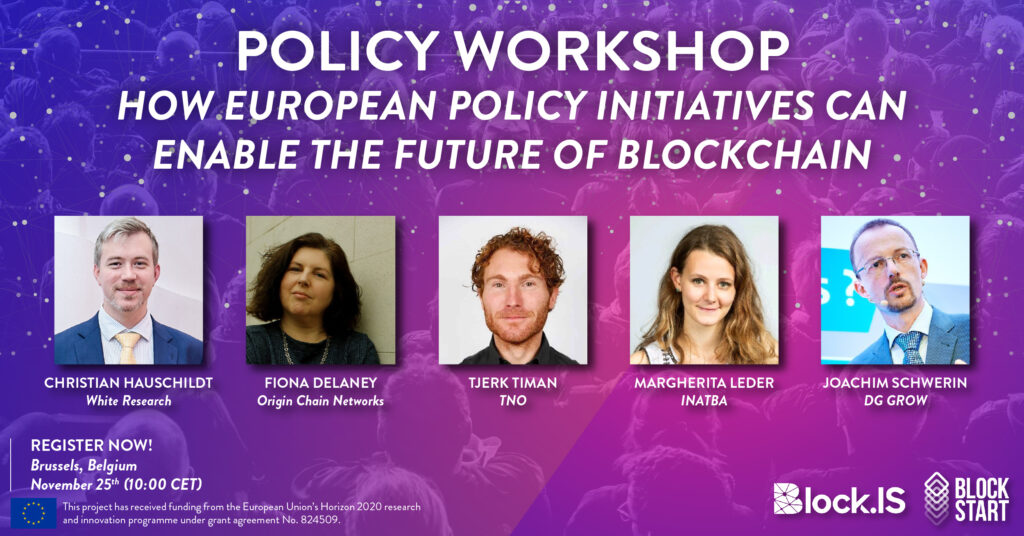On November 25th, partners of Block.IS and BlockStart blockchain startup acceleration programmes organize a blockchain regulation and policy workshop “How European policy initiatives can enable the future of blockchain”. The goal is to discuss the current state of the regulatory landscape in Europe, identifying the best practices and moments for advancement and providing input into removing regulatory barriers for SMEs to adopt DLT and developing a compelling legal framework.
Blockchain and related technologies have the potential to fundamentally transform a wide range of industries and the regulatory framework of such technology should be understood as a ‘living strategy’. It must be constantly reviewed to ensure that it grows with and encourages innovation within the industry.
The European landscape for blockchain regulation is varying. Some countries do not yet have a dedicated regulatory and legal framework for virtual assets. However, there is a growing number of countries that have already adopted or are developing legal frameworks and/or have announced guidelines for the legal treatment of virtual assets. Innovative policies, such as regulatory sandboxes, innovation hubs and other initiatives help to foster the development of blockchain technologies. However, there is a considerable grey zone of blockchain development that yet needs to be covered by the regulators. The workshop aims to identify the current directions of movement in the regulator landscape and discuss how the positive and tested policy initiatives, pilots and projects can be scaled up to different countries and broader contexts.
The workshop is aimed to bring together startups and SMEs developing and adopting blockchain solutions and main players in the blockchain policy landscape: policymakers, researchers, consultants. To cover these topics, the experts from EU Commission, research institutions and organizations representing startups will share their views and will aim to identify the most relevant directions for policy development:
- Margherita Leder, Board Member at INATBA. Margherita Co-Chairs the Working Group Education at INATBA since 2019. She also Co-Chairs the Digital SME Taskforce on Blockchain & DLTs. She graduated in Law from Bocconi University and currently leads a team of 30 employees as COO in TMP Group, an international media company founded in 2012 and specialized in digital communication. Alongside two other managers under-35 launched Hangar21 in Milan, the most innovative and complete technological center for multimedia production in Italy. After a journey within some international organizations, including AIESEC, she dedicated herself to the growth of corporate relations of non-profit organizations that are UN partners for the implementation of the 2030 Agenda, creating CSR collaborations with multinationals and technology players. She served in the Office of the First Counselor for the Italian Mission at the United Nations in Geneva, for whose contribution she received a formal reference letter from the Ambassador.
- Tjerk Timan, Senior Scientist at TNO. Tjerk Timan currently works as a policy analyst at TNO, The Netherlands. In this position he works questions around societal and organizational embedding of novel ICTs and the potential impact of new technologies on different actors. He brings both academic-and professional experience to the fields of law, technology and policy, science-and technologies studies, and ethical, legal, social and organizational impact assessment of novel ICTs. He publishes and presents about data, devices, policy, regulation and public values in relation to digital technologies regularly.
- Joachim Schwerin, Principal Economist at DG GROW, European Commission. Dr. Joachim Schwerin is Principal Economist in the unit responsible for the Digital Transformation of Industry within the Directorate-General Internal Market, Industry, Entrepreneurship and SMEs (DG GROW) of the European Commission. He is responsible for developing the policy approach of DG GROW towards the Token Economy and Distributed-Ledger Technologies as well as their applications for industry and SMEs. In 2020, he contributed to the Digital Finance Strategy, including the MiCA Regulation. Previous responsibilities after he had joined the European Commission in 2001 included the coordination of industrial and competition policy, the design of policy measures to improve SME access to digital finance and conceptual work on strategic aspects of the EU’s competitiveness in the global economy.
- Christian Hauschildt, Managing Director of White Research and Quality Manager of the EU Blockchain Observatory and Forum 2.0. Christian is the Managing Director and Head of EU Studies for White in Brussels. He has over 12 years of experience in strategy and policy consulting, with a focus on EU policy projects ranging from tech to sustainability. Christian has a BSc in Computer Science and Business Administration and an MSc in Management. Among his current projects is the EU Blockchain Observatory and Forum, carried out by a consortium of seven organisations: INTRASOFT International, the University of Nicosia, CERTH, OpenForum Europe, Bitfury, Planet and White Research. For this project Christian serves Quality Manager.
- Fiona Delaney, CEO and founder of tech start-up Origin Chain Network and Chair at Blockchain Ireland Startups Ecosystem. Origin Chain Network is recognised as “one to watch” in European technical innovation, winning the EU Innovation Award in 2020 for contributions to the field of agriculture and technology. Co-author of numerous papers on blockchain, DLT and sustainable food, Delaney has contributed to numerous standards in the field of distributed technologies and was recently appointed Co-Chair of EUOS Standards Observatory Blockchain WG where her strong commitment to developing open-source resources including open data, open standards and open software prevails.
Join the discussion on the 25th of November at 10 am, in Nhow Brussels Bloom, Rue Royale – Koningsstraat 250, Brussels.
